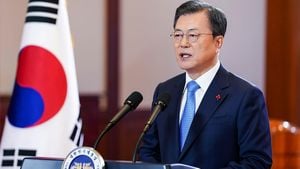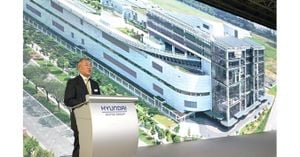Seoul city has taken significant steps to transform its real estate market by lifting land use restrictions on more than 290 apartments situated near the International Exchange Complex, effective February 13, 2025. This announcement follows the approval of the adjusted land transaction ordinance by the city’s Urban Planning Committee on February 12, 2025.
Among the 305 apartments previously affected, only 14 redevelopment projects will retain their restrictions due to concerns over potential speculative activities. These locations include notable developments like the Eunma Apartment and Jamsil Jugong Complex 5, which have passed safety inspections but still face scrutiny for their potential to escalate property speculation.
The decision was driven by growing discontent over excessively broad restrictions, which the Seoul city government acknowledged as infringing on property rights and limiting residents' ability to freely move and trade their homes. Mayor Oh Se-hoon expressed, "We are actively considering lifting Land Use Restrictions after careful consideration of the market conditions over the past few months. It’s time to promote healthy trading activities among our residents.”
Previously, the land use regulations limited the ability to purchase properties within specific areas, demanding approvals for transactions involving larger properties. The intention behind these regulations was to stabilize the real estate market during periods noted for volatility and speculative purchasing.
According to urban planning experts, this area’s restrictions were ever-present since June 2020, intended to mitigate speculation, particularly after the introduction of the MICE development project and the concurrent large-scale urban developments. The affected areas, often referred to as the "Jamsil-Samsung-Daechi-Cheongdam" zone, total approximately 14.4 km² of prime real estate.
Seoul city officials believe these changes will not only liberate property transactions but also rejuvenate the broader real estate market. Jo Nam-jun, the head of the Urban Space Division, emphasized, “If we see excessive price hikes or unusual trading patterns, we will re-implement restrictions to keep the market stable.” This approach aims to create selective but strategic land use regulations moving forward, enhancing property rights without encouraging speculation.
With the impact of these changes expected to ripple through the real estate market, analysts are closely monitoring reactions, especially concerning pricing and transaction volumes within the capital. It also signals future readiness to adapt regulatory frameworks to the ever-evolving dynamics of the housing market.
Forthcoming steps include gradually lifting restrictions on approximately 59 more sites by the year 2027. The strategy aims to create well-targeted regulations rather than blanket restrictions, which will allow for more organic growth within property transactions.
The objective is clear—allow residents greater freedom to move and invest, thereby ensuring the protection of property values from unnecessary rules enforced by local government policies. And as the city rolls out these changes, it seeks to balance growth and stability effectively.



